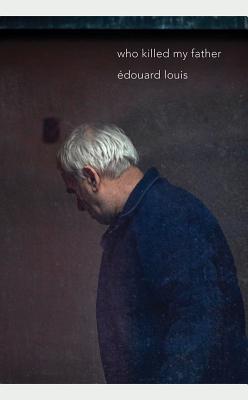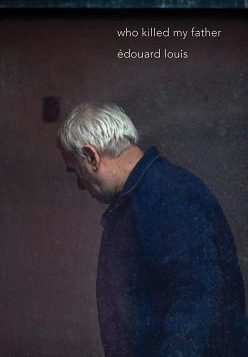 Who Killed My Father
Who Killed My Father
by Édouard Louis
Translated by Lorin Stein
New Directions. 96 pages, $15.95
“FROM MY CHILDHOOD I have no happy memories.” With that arresting sentence, Édouard Louis (born Eddy Belleguele) opened his stunning debut novel, The End of Eddy (2014), a work of autofiction that quickly propelled the 22-year old author onto the international stage of LGBT writers. In unflinching detail, Louis described growing up in a poor French village. It was, and remains, a world where “people never go anywhere,” a world where to be different in any way meant you were persecuted.
In his subsequent History of Violence (2016), Louis continued his gay odyssey, now focused on his post-village decampment to Paris, where, as a young, college-educated intellectual, he picked up a bit of rough trade who raped and nearly killed him. Even more than the first book, History of Violence incorporated the voices and points of view of the others in the “plot,” among them the bureaucratic police, his uncomprehending sister, and even the rapist, Reda, for whom he expresses a fleeting sympathy. The book explored how one’s own story can become muddied, even lost, in “official” accounts, unsympathetic misunderstandings, and incomplete recollections until “it disappears for good and can never be retrieved.”
This theme—the existence of competing versions of the truth—is taken up again in Louis’ third literary inquiry into the material of his young life. Who Killed My Father is a small book, but it packs a big punch. Early on, Louis declares that what he is writing “does not answer to the standards of literature, but to those of necessity and desperation, to standards of fire.”
 Violence pervades this world, so much so, Louis says, that the villagers don’t even recognize what they experience and express as violence. For them, violence is life. The exemplar of that network of poverty and violence is Louis’ father, who takes center stage here. Beaten down by his numbing job, an unhappy marriage, and the unrelenting code of hyper-masculinity, the father retreats into a brooding, alcoholic silence punctuated by bouts of rage. “It was the rule in the world you lived in,” the son says to the father: “be a man, don’t act like a girl, don’t be a faggot.” The father’s obsession with masculinity often spills out as revulsion over his son’s femininity. “Why do you always go around acting like a girl?” he yells at Édouard. “Everyone in the village says you’re a faggot.” One night, at the village café, in front of everyone, he declares that he wished he’d had another son instead of Édouard. “For weeks,” Louis says, “I wanted to die.”
Violence pervades this world, so much so, Louis says, that the villagers don’t even recognize what they experience and express as violence. For them, violence is life. The exemplar of that network of poverty and violence is Louis’ father, who takes center stage here. Beaten down by his numbing job, an unhappy marriage, and the unrelenting code of hyper-masculinity, the father retreats into a brooding, alcoholic silence punctuated by bouts of rage. “It was the rule in the world you lived in,” the son says to the father: “be a man, don’t act like a girl, don’t be a faggot.” The father’s obsession with masculinity often spills out as revulsion over his son’s femininity. “Why do you always go around acting like a girl?” he yells at Édouard. “Everyone in the village says you’re a faggot.” One night, at the village café, in front of everyone, he declares that he wished he’d had another son instead of Édouard. “For weeks,” Louis says, “I wanted to die.”
Amazingly, Louis finds it within himself to express empathy for his father: “You were as much a victim of the violence you inflicted as of the violence you endured.” He comes to see his father as suffering under a system that hands down “verdicts” against people who don’t fit the norm. “Verdicts have been handed down against us because we’re gay, or trans, or women, or black, or poor, verdicts that have placed certain lives, certain experiences, certain dreams, out of our reach.” Louis emphasizes the commonality between gay people and poor people, both of whom have been oppressed, beaten down, made to feel humiliated. While all of this will be familiar to anyone who has read Louis’ two previous books, here he points even more explicitly to the ruling class and its political system as the custodians of this oppressive system, which condemns the disenfranchised to a “premature death.”
When a horrible accident at the factory leaves the father with a crushed, mangled back, the full impact of “the violent line—between those who wear suits and those who wear tee shirts”—hits hard. Over the next few years, during which the father’s pain never abates, the government announces policies against les assistés, those on public assistance, that make the father’s situation even worse. “This kind of humiliation by the ruling class broke your back all over again,” Louis declares. Threatened with the loss of welfare, and despite the excruciating pain, the father returns to work, no longer in the factory but at part-time manual labor in a town 25 miles away. Louis notes: “Just getting there and back cost you three hundred euros a month in gas,” an observation, incidentally, that helps to explain the background behind this year’s Yellow Vest protests.
Louis’ own rage at a succession of French administrations that have failed to recognize—indeed, have shown contempt for—France’s working poor is palpable. Chirac, Sarkozy, Hollande, Macron—he condemns them all as “murderers who are never named for their murders.” “I refuse to let those names be forgotten,” he cries. “I want to inscribe their names in history, as revenge.”
In the final pages of the book, he notes that his father’s temperament has begun to change. Gone is the old homophobia and xenophobia, replaced by a willingness to consider his son’s point of view, to take pride in the life Édouard has made for himself. For all that, Louis sadly notes that the father’s chance to fashion a different life for himself—“to uncover the person you’ve become”—has passed.
Louis’ book is a modern-day “J’accuse.” As much as he rails against his father’s brutality toward him when he was a boy, the real enemy, the real perpetrator of violence, is a system that never allows people like his father to tell their own story, to have a say in their lives. This double agony—the suffering of the son who escaped the little French village and the suffering of the father who remains stuck there—is a painful and heart-rending reminder of how much still needs to change before the just society we long for becomes a reality.
Philip Gambone’s interview with Édouard Louis appeared in the March–April 2018 issue of this magazine.





